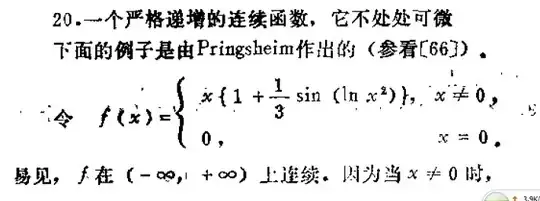Today,my frend ask this follow question:and I consider sometime,and I can't solve it.
I hope see someone can help me
Question:
let $f$ is continuous strictly increasing function,
prove or disprove :the $f$ Non-differentiable points countably infinite?
since the contably infinite define:
http://en.wikipedia.org/wiki/Countable_set
and I find somebook,and I found this 
This follow famous example(Pringsheim) is $f$ is continuous strictly increasing function,and there exsit a point not differentiable $$\begin{cases} x(1+\dfrac{1}{3}\sin{(\ln{x^2})}&x\neq 0\\ 0&x=0 \end{cases}$$
we can show $f$ is strictly increaing and continuous on $R$,but $x=0$,$f$ is not differentable.
But My question:
there exsit $f$ such strictly increaing and continuou,but have infinite point not differentable?
I can't have coumexample,Thank you very much!